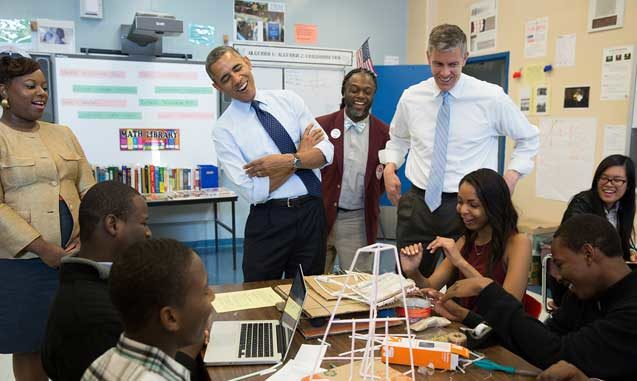
Lynette Monroe
Last week, late nights, family road trips, and endless leisure came to an abrupt halt as children across the country headed back to school. This year, however, there is something else that requires adjustment besides early mornings and evening homework assignments. This year, a revised national education law goes into effect: the Every Student Succeeds Act (ESSA). ESSA is the reauthorization of the 1965 Elementary and Secondary Education Act (ESEA) signed into law by Barack Obama in 2015.
ESEA included landmark legislation such as the Adult Education Act (1966), which provided funding for supplemental education centers and mandated educational programming even during “out-of-session” periods for isolated and rural areas; the Women’s Educational Equity Act, which protected women and girls from discrimination in education; ESEA also included protections for those who suffer from discrimination based on race, ethnicity, or disability. ESEA has been updated every five years since it was signed into law. The original intention of ESEA was to provide equal access to quality education, emphasize high standards and accountability, authorize funds for professional development, design effective instructional materials, provide supplemental education programs, and promote parental involvement.
Previous reauthorizations include the now infamous No Child Left Behind (NCLB), signed into law by President George W. Bush in 2001. ESSA replaces NCLB.
Education has been hailed the “new civil rights issue.” However, as we know, all too well, a law alone will not save us. The unanimous decision in Brown v. the Board of Education occurred in 1954; it was not until 1988 that school integration reached an all-time high with 45 percent of Black students attending majority-White schools. In 2003, a study by Harvard’s Civil Rights Project found that schools were more segregated in 2000 than in 1970 when busing for desegregation began. So we see, that laws alone will not fix decades of restricted access and rationed opportunity. We also can conclude that without a watchful eye we are bound to repeat history.
During an interview at the University of California Berkley on October 11, 1963, Malcolm X said that if the government, “really passed meaningful laws, it would not be necessary to pass any more laws. There are already enough laws on the law books to protect an American citizen. You only need additional laws when you are dealing with someone, who is not regarded as an American citizen.”
The goal of the 2015 reauthorization of ESEA is equity, but so was that the goal in 1965. A major component of both the 1965 ESEA and ESSA as the 2015 reauthorization is parental involvement. We must be the change we want to see. Laws are an opportunity to hold our leaders accountable. We must hold ourselves accountable for the academic success of our children. At the 1979 Amandla Festival in support of relief and humanitarian aid to Southern Africa, Dick Gregory, in his fifteen minute introduction of Bob Marley and Wailers, stated:
“We the decent people of this planet must stand up and say to the rest of them inhumane, cruel beast that we are not going to tolerate it no more. And then they’ll say, “what are you gon’ do about it?” If I don’t do nothing, but get out of my bed everyday and look myself in the face in the quietness of my living room and say, “I’m not gon’ tolerate it no more, I’m not gon’ tolerate it no more, I’m not gon’ tolerate it no more” that alone, when enough people stand doing it, is enough to win.”
So, let’s challenge ourselves this academic year to say, “we not gon’ tolerate it no more.” We are not going to tolerate inadequate resources, unqualified teachers, unresponsive school boards, and low academic standards. Let’s challenge our children to rise to the occasion. Let’s challenge ourselves to attend community meetings, to join the PTA, to check our children’s homework, and to make sure our children’s teachers know us by name.
Learn more about the Every Student Succeeds Act at nnpa.org/essa.
Lynette Monroe is a master’s student at Howard University. Her research area is public policy and national development. Ms. Monroe is the program assistant for the NNPA’s Every Student Succeeds Act Public Awareness Campaign. Follow Lynette Monroe on Twitter @_monroedoctrine.
Recommended For You.



Be the first to comment